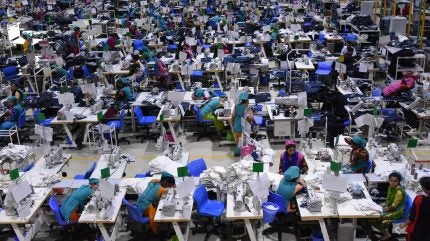
The study, titled ‘Waiting game: Minimum wage-setting in Bangladesh’s apparel industry,’ led by researcher Jason Judd, Brian Wakamo and Sarosh Kuruvilla highlights how postponing wage adjustments adversely affects employees.
The absence of more frequent reviews leads to significant strife for workers, business owners, and the government due to the lack of adjustment for inflation on workers’ earnings, notes the report.
Bangladesh’s readymade garment (RMG) sector represents more than 80% of the nation’s total exports and employs approximately 4m individuals.
According to a 2024 study by the US International Trade Commission on apparel competitiveness, Bangladesh’s manufacturing wages have the lowest purchasing power among leading garment-producing nations, partly due to its wage policy.
Currently, Bangladesh revises the minimum wage for its garment workers every five years with the latest revision occurring in 2023.
Labour groups in Bangladesh have advocated for a yearly wage review mechanism and a new monthly minimum wage of BDT23,000 (approximately $200) as of 2023. However, these demands led to widespread protests against employers and the then Prime Minister Hasina’s administration.

US Tariffs are shifting - will you react or anticipate?
Don’t let policy changes catch you off guard. Stay proactive with real-time data and expert analysis.
By GlobalDataThe former Hasina government and the Bangladesh Garment Manufacturers and Exporters Association (BGMEA), dismissed these calls.
Instead, they increased the minimum wage to BDT12,500 ($113), up from BDT8,000 ($75) set in 2018. This latest hike includes an automatic annual increment of 5% on the base pay until it is reassessed in 2028.
The university researchers said that with consumer prices rising at an annual rate of around 9-10% over the past two years in Bangladesh, those earning minimum wages or close to it are experiencing a decline in their real income each year.
Labour activists propose that annual minimum wage revisions should include representation by a legitimate trade union delegate selected by labour federations rather than a government-appointed individual on the wage board, indicated the Cornell University report.
The researchers explain that some advocates argue that the base salary — which determines bonuses and allowances — should constitute a larger portion of the minimum wage. While others call for an overhaul and simplification of the entire system governing base pay, bonuses, and allowances.
Major global fashion brands and retailers support calls for increased wages and an annual review process but stop short of backing the specific figures suggested by labour activists.
The report also said that employers who oppose yearly minimum wage revisions argue that such a system could lead to higher average increases than previously seen. They express concern that governments might inflate wages for political favouritism or loyalty without considering whether productivity improvements or company profits can sustain these raises. They fear that escalating labour costs will diminish their industry’s competitiveness.
Critics also contend that if local costs become too high, international buyers may turn to alternative suppliers which could result in factory shutdowns and job losses within Bangladesh’s garment sector.
The Cornell University report mentions that after Cambodia implemented an annual wage review policy, its apparel exports continued to grow. However, it does not address the responsibilities of buyers and brands in this context.
Wage actions for Bangladesh government to consider
The GLI report suggests several actions for the Bangladesh government to consider:
1. Institutionalise an annual review of minimum wages.
2. Announce a review of the 2023-set minimum wage to occur in 2025.
3. Secure explicit assurances from brands supporting wage increases through higher prices.
4. Differentiate between bona fide worker representatives and others in wage-setting and social dialogue.
5. Extend freedom of association and bargaining rights to workers in export processing zones.
BGMEA’s former director Shams Mahmud argued the researchers might lack a comprehensive understanding of Bangladesh’s RMG sector, according to local news publication The Business Standard.
The publication quoted Mahmud as saying: “Our existing labour law already mandates at least a 5% yearly increase on garment workers’ basic salary. In EPZ factories, this rate is even higher. Workers also receive additional support from their factories.”
A new study by the BHRRC has flagged concerns over migrant worker abuse in global fashion supply chains



